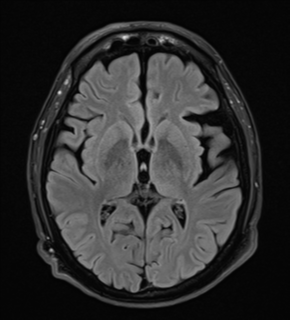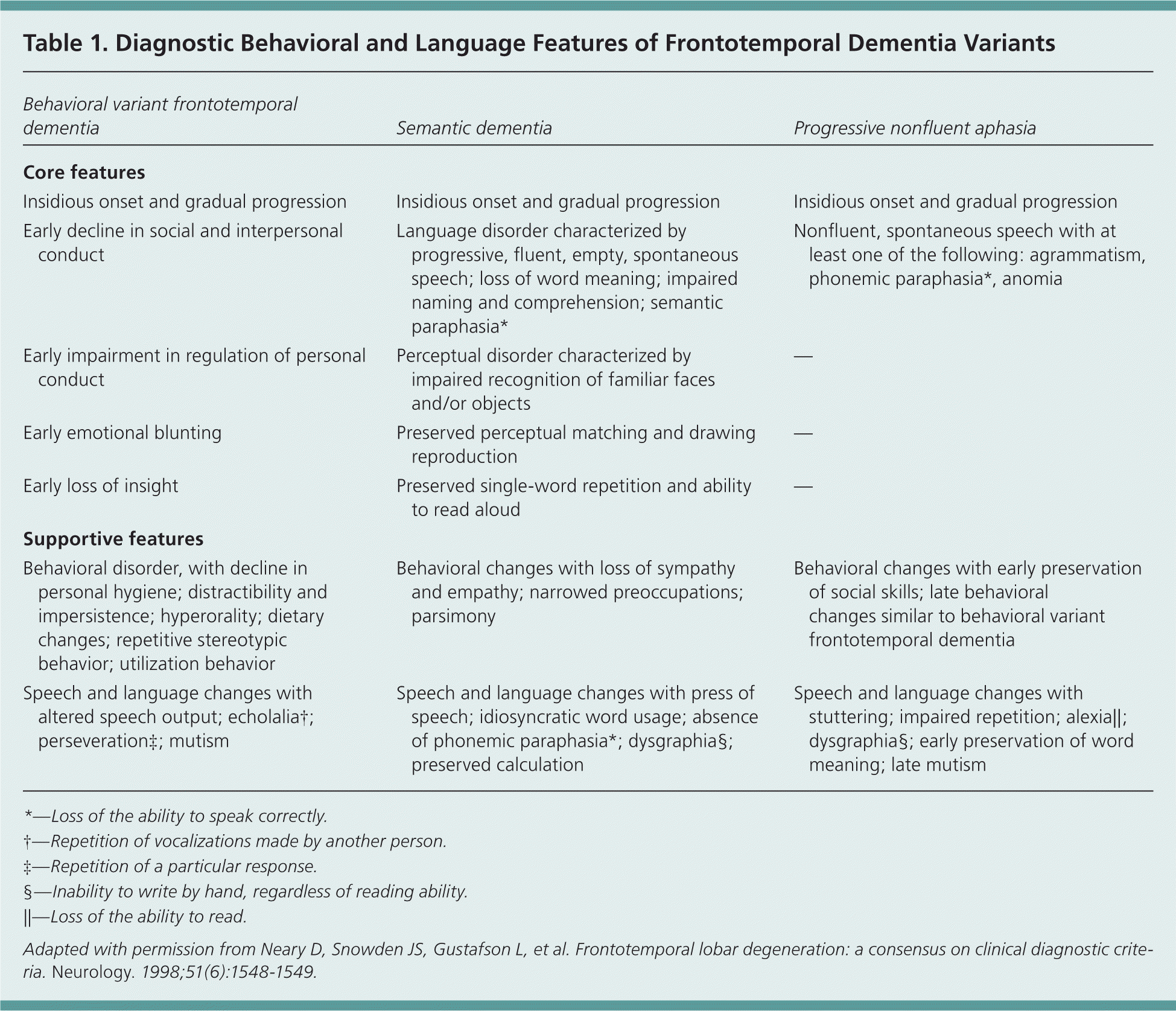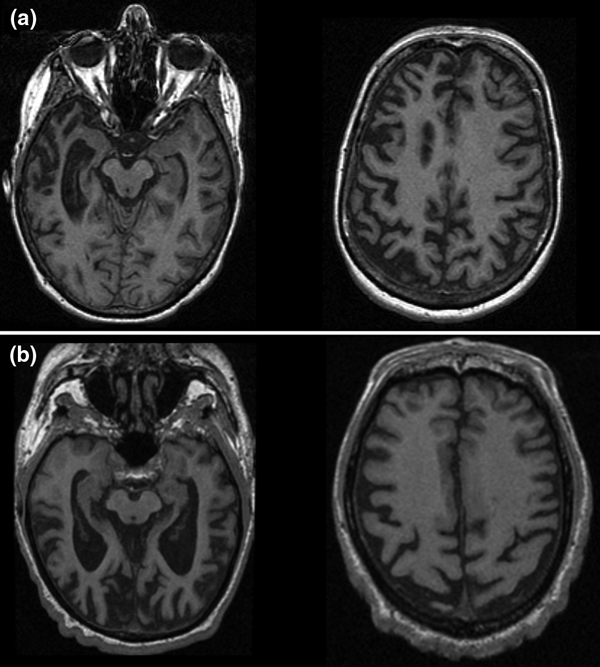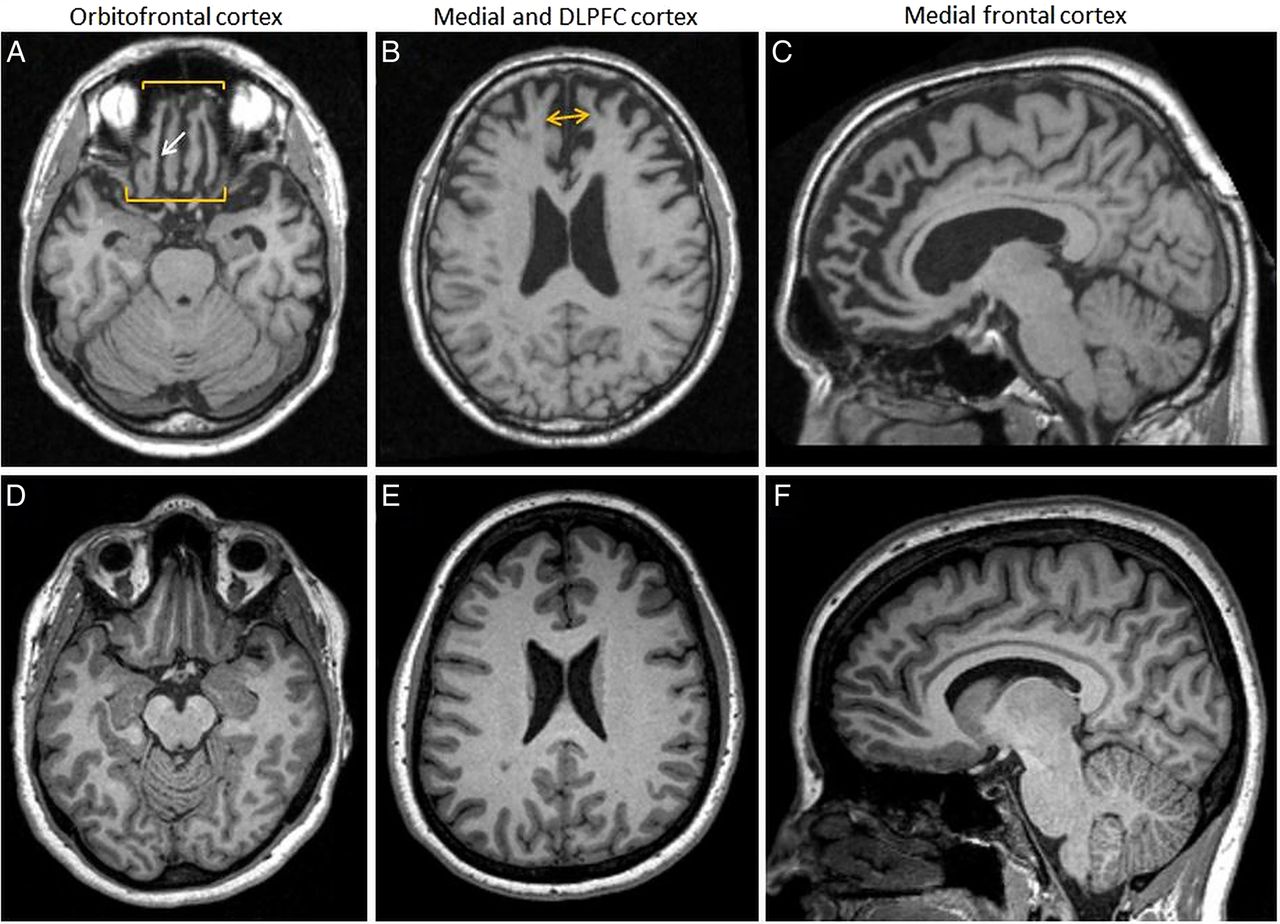Behavioral Variant Dementia | Behavioral Variant Frontotemporal Dementia
Di: Luke
Frontotemporal dementia (FTD) is a neurodegenerative disease with behavioral and language variants [ 1 ]. Objective: To characterize the cognitive and neuropsychiatric symptoms of patients with behavioral variant frontotemporal dementia (bvFTD) over the natural course of the disease.FTD is the second most frequent cause of early-onset dementia, also affecting older subjects [].Behavioral variant frontotemporal dementia-related pattern (bvFTD-RP) and the spatial correlation with the glymphatic function. 2 A Patient’s uide to Behavioral ariant Frontotemporal Dementia (bvFTD) What is dementia? When medical professionals use the term “dementia,” it .類義語:frontotemporal lobar dengeration (FTLD) 、behavioral variant frontotemporal dementia (bvFTD) 前頭側頭型認知症は 人格変化 や 行動異常 に特徴づけられる症候群であり、 大脳 の前方部( 前頭 側頭葉 )に限局性変性を示す疾患群( 前頭側頭葉変性症 とよばれる)に認められる。Patients with behavioural-variant frontotemporal dementia (bvFTD) present with insidious changes in personality and interpersonal conduct that indicate progressive disintegration .Frontotemporal dementia (FTD) is a neurodegenerative condition associated with bizarre social features and personality change. People with this disorder may have problems with cognition, but their memory may stay relatively intact. , 2009 , 2010 ).Younger cases of FTD, with onset before the age of 30, tend to exhibit frequent .Rates of early-onset FTD are high with 13% of individuals with FTD being under the age of 50 ().Behavioral variant FTD is the most heritable of the frontotemporal dementia variants [ 22 ]. Unlike Alzheimer’s disease (AD), patients fall ill at a younger age and develop psychiatric symptoms first, which often has resulted in wrong or late .
How preserved is episodic memory in behavioral variant
psychiatryonline.Behavioral variant frontotemporal dementia (bvFTD) is a neurodegenerative disease characterized by early progressive changes in behavior, social conduct, emotional . These changes result from frontotemporal lobar degeneration (FTLD) associated with a range of heterogeneous pathologies ( Mackenzie et al. The diagnosis of bvFTD remains challenging because of the limited . While previous criteria have increased the ability of diagnosticians to distinguish between bvFTD and other neurocognitive disorders such as .Introduction: Empathy relies on fronto-cingular and temporal networks that are selectively vulnerable in behavioral variant frontotemporal dementia (bvFTD).Frontotemporal dementia (FTD) is a clinically and neuropathologically heterogenous neurodegenerative disorder characterized by disturbances in behavior, personality, and language associated with degeneration of frontal and temporal brain regions []. Online ahead of print.Bing-Neel Syndrome Mimicking Behavioral Variant Frontotemporal Dementia Neurology. A total of 60 patients with bvFTD and 61 age- and sex . The glymphatic function has not yet been explored in bvFTD. Objective: Studies have shown variable memory performance in patients with behavioral variant frontotemporal dementia (bvFTD).The pattern of glymphatic inflow overlaps with the geographic pattern of behavioral variant frontotemporal dementia (bvFTD). Introduction: Sleep and rest-activity rhythm alterations are common in neurodegenerative diseases.This article reviews many of the complex facets of behavioral variant frontotemporal dementia (bvFTD) and frontotemporal lobar degeneration (FTLD).The behavioral variant of frontotemporal dementia (bvFTD) slowly undermines emotion, social behavior, personal conduct, and decision making.
Behavioral Variant Frontotemporal Dementia
Accounting for this symptomatology is a pronounced and relatively focused neural loss in bilateral .Behavioral and psychologic symptoms may result from functional changes related to dementia: Reduced inhibition of inappropriate behaviors (eg, patients may undress in .Background: Although social cognitive dysfunction is a major feature of the behavioral variant of frontotemporal dementia (bvFTD), quantitative measurement of social behavior changes is poorly available in clinical settings.To identify distinct behavioral phenotypes of behavioral-variant frontotemporal dementia (bvFTD) and to elucidate differences in functional, neuroimaging, and progression to .
Behaviour Variant Frontotemporal Dementia
People with bvFTD can act strangely around other people, resulting in embarrassing social situations. We investigated rest-activity rhythm alterations, sleep disturbances, and their neural correlates in bvFTD. However, their characterization in patients with behavioral variant frontotemporal dementia (bvFTD) has proven elusive.
Defining the Behavioral Variant of Alzheimer Disease
This video was made by Alenni Paola López Pérez.Diagnosis and management of behavioral variant .

Behavioral and psychological symptoms such as agitation, anxiety, and psychosis are very common among people with dementia.FTD comprises three distinct .FTD consists of three clinical variants distinguished by the predominant .
Behavioural-variant frontotemporal dementia: an update
February 15, 2022. We investigated whether .Summary of Consensus Recommendations – The Journal of . Repetitive behaviour and dementia. Its behavioral .We review these aspects in the chapter “ Behavioural variant frontotemporal dementia: Recent advances in diagnosis and understanding of the disorder” and also potential . However, as described earlier, there are . The diagnosis of this disease can be elusive .

Trailing, following, . Methods: We examined the initial and subsequent neuropsychological test performance and neuropsychiatric symptoms in a large cohort of . Although most patients with bvFTD become less sensitive to negative emotional cues, some patients become more sensitive to positive emotional stimuli. Understanding these behavioral changes can .

to Behavioral Variant Frontotemporal Dementia (bvFTD) This material is provided by UCSF Weill Institute for Neurosciences as an educational resource for patients.

The behavioural variant of frontotemporal dementia (bvFTD) is a frequent cause of early-onset dementia. This study modeled when in the disease process empathy changes begin, and how they progress.Behavioral variant frontotemporal dementia. We also sought to compare performance of patients with bvFTD and . BvFTD is characterized by a deterioration in cognition and social behavior.govDiagnosis and Management of Behavioral Variant .Alzheimer’s Disease or Behavioral Variant Frontotemporal Dementia? Review of Key Points Toward an Accurate Clinical and Neuropsychological Diagnosis – PMC.govEmpfohlen auf der Grundlage der beliebten • Feedback Key aspects of management and the future of diagnosis and care for the disorder are highlighted. The behavioral variant of Alzheimer disease is clinically most like behavioral variant frontotemporal dementia (bvFTD) and is pathophysiologically most .The behavioral variant of frontotemporal dementia (bvFTD) is a neurodegenerative disease that is characterized by progressive changes in personality, social behavior, and cognition.Purpose of review: This article describes the clinical, anatomic, genetic, and pathologic features of behavioral variant frontotemporal dementia (bvFTD) and discusses .One of these disorders is behavioral variant frontotemporal dementia (bvFTD).Purpose of review: This article describes the clinical, anatomic, genetic, and pathologic features of behavioral variant frontotemporal dementia (bvFTD) and discusses strategies to improve diagnostic accuracy, emphasizing common pitfalls to avoid.Behavioral variant frontotemporal dementia (bvFTD) is a syndrome defined by a set of core clinical criteria, which include disinhibition; apathy or inertia; loss of sympathy or .

We tested the efficacy and tolerability of one-year treatment with memantine (10 mg bid) in behavioral variant frontotemporal dementia (bvFTD). The diagnosis of bvFTD remains challenging because of the limited accuracy of neuroimaging in the early disease stages and the absence of molecular biomarkers, and therefore relies predominantly o . (A) The bvFTD-RP was identified from the 18 F-FDG PET data of 26 patients with bvFTD and 29 age- and sex-matched healthy controls from the discovery dataset using the spatial covariance analysis .
What causes changes in behaviour in people with dementia? Reducing and managing behaviour that challenges. However, some cases of extremely early onset have been reported in which the initiation of . Our study investigated whether this variability is due to the admixture of patients with true bvFTD and phenocopy patients.Frontotemporal dementia (FTD) is a neurodegenerative disorder characterized by progressive deterioration of behavior and/or language associated with marked atrophy of frontal and/or temporal lobes [].Frontotemporal dementia (FTD) is a progressive neurodegenerative disorder accompanied by behavioral and personality changes and/or language deterioration.Behavioural-variant frontotemporal dementia (bvFTD) is characterised by insidious changes in personality and interpersonal conduct that reflect progressive disintegration .The behavioral variant of frontotemporal dementia (bvFTD) is the second-most common cause of dementia under the age of 65, but accurate diagnosis is often delayed for .Learn about Behavior Variant Frontotemporal Dementia (bvftd). Behavioral variant frontotemporal dementia (bvFTD) is a neurodegenerative disease characterized by early progressive changes in behavior, social conduct, emotional processing as well as specific cognitive impairments (1, 2). One clinical feature of FTD is an early onset; most patients experience disease onset between the ages of 45 and 65 years [ 2, 3 ]. Models for illustrative purposes only.Behavioral variant frontotemporal dementia (bvFTD) is a neurodegenerative disease characterized by profound changes in emotions and empathy.0000000000200668.Results of meta-analyses on behavioral and neuropsychiatric total scores between the behavioral variant of Alzheimer disease (bvAD) and typical Alzheimer disease (tAD) (A) . Authors Markus Donix 1 , Robert Haussmann 2 , Moritz D Brandt 3 , Jennifer Linn 4 Affiliations 1 Department of Psychiatry . In 1998, Neary and colleagues articulated diagnostic criteria, which included a set of “core” and “supportive .For behavioural variant frontotemporal dementia, mild changes in behaviour or personality, without major changes in social or occupational functioning, would be expected. Along the bvFTD-psychiatric spectrum are patients that initially present with behavioural and neuropsychiatric features; yet, they do not show frontotemporal atrophy or hypometabolism on imaging and do not progress to develop cognitive decline or . The most common FTD, behavioral variant frontotemporal dementia (bvFTD), involves changes in personality, behavior, and judgment.Behavioural Variant Frontotemporal Dementia Phenocopy Syndrome.
Sleep and circadian rhythm disruptions in behavioral variant
Objective: The aim of the study is to evaluate diagnostic accuracy of social-emotional questionnaires in distinguishing bvFTD from . The spatial correlation between regional glymphatic function and bvFTD remain unknown. Recommendations to . BvFTD patients aged 45 to 75 years, with a Mini-Mental Status Examination (MMSE) score ≥19, were enrolled in a national, randomized, double-blind, placebo-c . Symptoms can include: Problems planning and sequencing (thinking through which steps come first, .The behavioral variant of frontotemporal dementia (bvFTD) is the second most common cause of dementia for individuals <65 years old, but accurate diagnosis is often delayed for several years. The diagnosis is made on the basis of clinical diagnostic criteria.orgBehavioural-variant frontotemporal dementia: diagnosis, . Often, they don't know or care that their . A particular focus is . Between 30 and 50% of patients with bvFTD have a positive family history, with an . Similarly, a change in speech or language functioning would be expected in individuals with evolving primary progressive aphasia. These deficits occur in concert with focal .govEmpfohlen auf der Grundlage der beliebten • Feedback
Research Criteria for the Behavioral Variant of Alzheimer Disease
The most common FTD, bvFTD, involves changes in personality, behavior, and judgment.Background Semantic behavioral variant frontotemporal dementia (sbvFTD) is a neurodegenerative condition presenting with specific behavioral and semantic .The behavioural variant of frontotemporal dementia (bvFTD) is a clinical syndrome characterized by a progressive deterioration of personality, social comportment and cognition.
前頭側頭型認知症
Frontotemporal dementia (FTD) refers to a group of dementias characterized by degeneration in the frontal and temporal lobes of the brain (). Methods: Four hundred thirty-one individuals with asymptomatic genetic FTD .

- Behandlung Verweigern Erklärung
- Begutachtungsleitlinien Fahreignung
- Begräbnisstätten Magdeburg | Magdeburger Friedhöfe und Begräbnisstätten
- Behindertengerechter Zugang Vorschriften
- Befehl Zur Vollziehung Eines Arrests
- Bega Restaurant Dortmund Speisekarte
- Bein Sport 1 En Direct Gratuit
- Beihilfe Formulare – Formulare / Vordrucke
- Beitragsbemessungsgrenze 2024 Kv Pv
- Beginn Des Kirchenjahres : Kirchenjahr
- Being A Wallflower Lesson Plan
- Bei Unwetter Nicht Zur Arbeit | Bei Unwetter nicht zur Arbeit? Das gilt für Arbeitnehmer
- Beeketal Bedienungsanleitung : Seite 1 von 9 Bedienungsanleitung
- Beitragsbelastung Gleitzone 2024